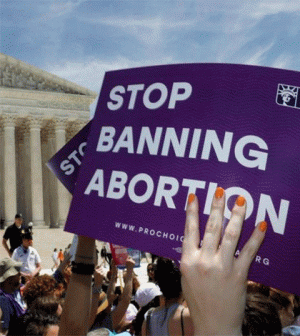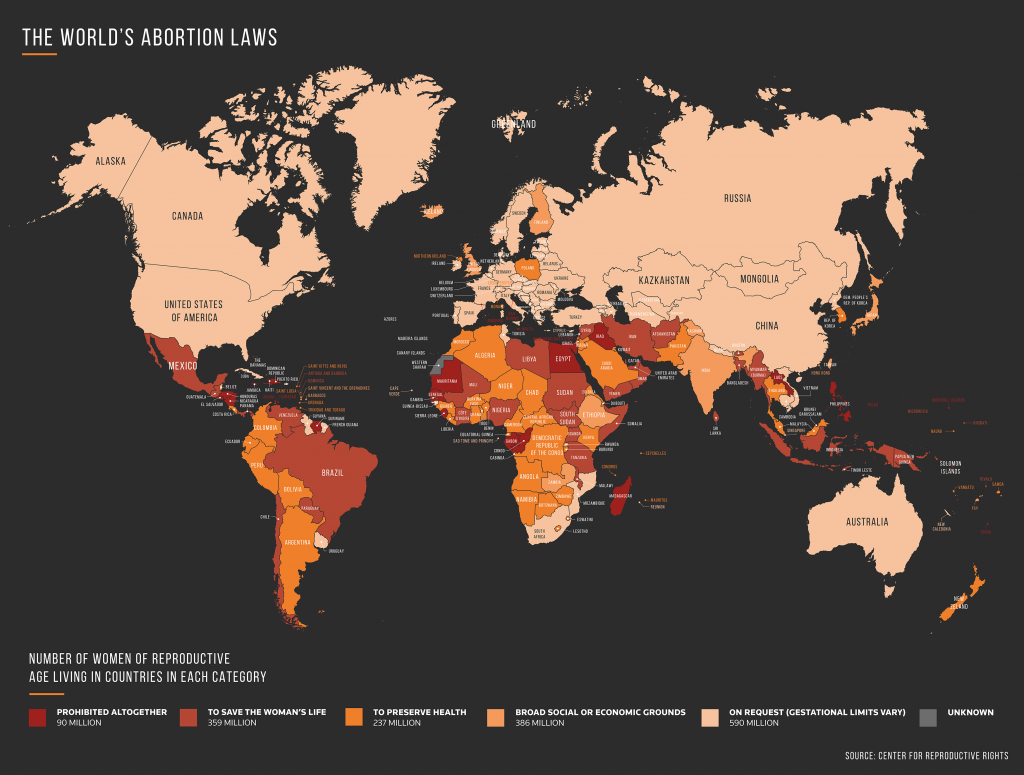- Finding Unshakable Power in a World That Wants to Pull Us ApartPosted 5 months ago
- What could a Donald Trump presidency mean for abortion rights?Posted 5 months ago
- Financial Empowerment: The Game-Changer for Women in Relationships and BeyondPosted 6 months ago
- Mental Health and Wellbeing Tips During and After PregnancyPosted 6 months ago
- Fall Renewal: Step outside your Comfort Zone & Experience Vibrant ChangePosted 6 months ago
- Women Entrepreneurs Need Support SystemsPosted 6 months ago
Abortion map shows U.S. bans in 'stark contrast' to global trend

By Emma Batha | Thomson Reuters Foundation
Reproductive rights experts say bans do not stop abortions but drive them underground, causing an estimated 23,000 deaths a year.
VANCOUVER, June 4 – A new world map of abortion laws shows an “overwhelming” trend towards liberalization, reproductive health experts said on Tuesday, despite a flurry of restrictions passed by U.S. states.
But the “wildly unacceptable” U.S. bans could send a dangerous message to other countries, said Katherine Mayall of the New York-based Center for Reproductive Rights (CRR) lobby group, warning that there was no room for complacency.
“It may seem like we’re constantly inundated with news about regression,” said Mayall, a lawyer with CRR, which will launch the map at the world’s biggest gender equality conference in Vancouver.
“(But) there really is much to be celebrated,” she said as the moves in the United States were in “stark contrast” to the overall trend.
Alabama enacted the strictest abortion law in the United States last month, prohibiting it even in cases of rape. Other states have banned terminations after the fetus’s heartbeat can be detected.
Many of the restrictions are intended to draw legal challenges, which religious conservatives hope will lead the nation’s top court to overturn the 1973 Roe v. Wade decision that established a woman’s right to terminate her pregnancy.
CRR’s map showed that 26 countries – mostly in Africa, Asia and Latin America – do not allow abortion under any circumstances, even when the mother’s life or health is at risk.
These countries are home to 90 million women of reproductive age, 5% of the global total.
They include Egypt, Iraq, the Philippines and El Salvador where women have been jailed for decades after being accused of procuring an abortion – in some cases when they have suffered miscarriages.
 Reproductive rights experts say bans do not stop abortions but drive them underground, endangering lives and causing an estimated 23,000 deaths a year. But abortion opponents say the fetus’s right to life transcends all other rights.
Reproductive rights experts say bans do not stop abortions but drive them underground, endangering lives and causing an estimated 23,000 deaths a year. But abortion opponents say the fetus’s right to life transcends all other rights.
Overall, 59 percent of women of reproductive age live in countries that broadly allow abortion, while 41 percent live under restrictive laws.
Nearly 50 countries have relaxed abortion laws in the last quarter century, including 18 that have overturned complete bans, Mayall said.
Ireland made headlines last year when the once staunchly Catholic country voted to scrap its prohibition in a referendum.
“There’s an overwhelming global trend towards liberalization, and this trend has continued in the face of a significant backlash,” said Mayall.
Reproductive rights is a key topic at the Women Deliver conference where delegates are debating how to accelerate progress towards a gender equal world.
Mayall said ensuring girl’s and women’s rights to safe and legal abortion had huge implications for broader equality as it impacted their ability to pursue education, employment and opportunities to participate in public life.
“Whether or not a woman has access to safe abortion care often has repercussions that will affect the trajectory of her entire life,” she added.
But she said liberalizing laws was only a first step; countries must also make abortion easily accessible.
Mayall praised Nepal, which only legalized abortion in 2002, for passing a progressive new reproductive health law last year providing for abortion services throughout the country.
(Reporting by Emma Batha @emmabatha; Editing by Katy Migiro. Please credit the Thomson Reuters Foundation, the charitable arm of Thomson Reuters, that covers humanitarian news, women’s and LGBT+ rights, human trafficking, property rights, and climate change. Visit http://news.trust.org)
Our Standards: The Thomson Reuters Trust Principles.






